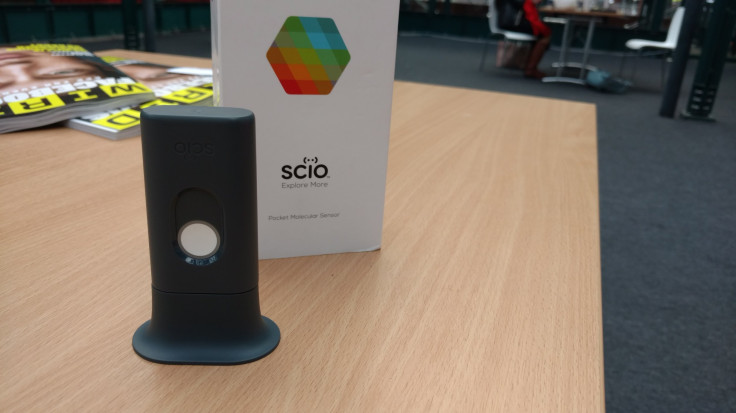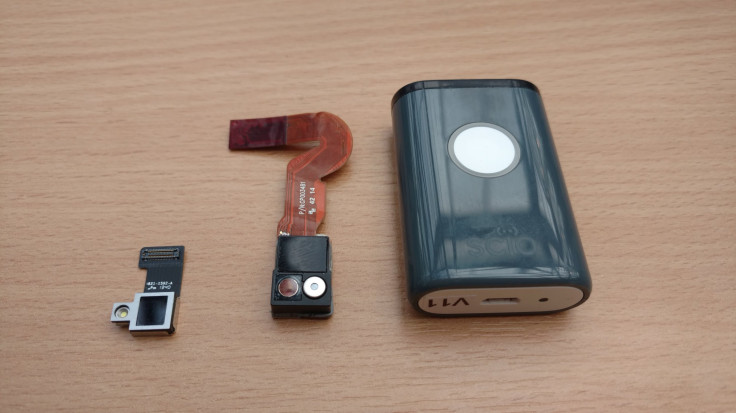Star Trek-Like Molecular Scanner Coming To Smartphones Can Tell You If Your Viagra Is Fake

LONDON -- Imagine being able to use your smartphone to tell how ripe a piece of fruit is; if a bottle of wine is any good; if the food you are about to eat is safe; or if the pill you are about to swallow is what it claims to be. It may sound like something you would see on "Star Trek," but this will all be possible within two years -- if not sooner -- according to the inventor of a molecular sensor that is small enough to fit inside the latest smartphones.
Israeli startup Consumer Physics is just about to ship its first product, a pocket-size molecular sensor called SCiO that works with your smartphone to allow you check the chemical makeup of any substance. However, at the Wired 2015 conference in London on Thursday, company co-founder Dror Sharon showed off a prototype of a sensor that will fit inside the slimmest smartphones on the market today.
Sharon won’t talk about any potential smartphone partners his company is talking to, but he told International Business Times after his talk that “a two-year timeline is realistic, and less than that is possible.” Sharon also indicated this sensor could be embedded in wearable devices and smart home appliances.

Identifying Viagra
Onstage Sharon demonstrated how SCiO could be used to validate the chemical composition of drugs, using the device to successfully identify a Viagra pill, the world’s most counterfeited drug. The device is able to do this by bouncing light waves off the object being identified to relay molecular information. This is then sent to the cloud and tested against what Sharon calls “the world’s largest database for molecular fingerprints.”
The SCiO is essentially a pocket version of a mass spectrometer, technology that occuped a whole room when it was invented in the 1970s. The potential uses for the technology are huge, but Sharon says the food and agriculture industries are a natural fit.
Allergy Testing
One potentially huge benefit of this technology is in identifying foods that contain ingredients people are allergic to, but Sharon says this is not something SCiO will be able to do initially, as liability is a big hurdle to overcome.
The sensor can identify foods that are high in gluten, for example, but because it is unable to guarantee it will identify something that makes up less than 1 percent of the total mass of the food being scanned, the company says it should not be used for allergens or toxins where mere milligrams could kill. It can, however, help with food intolerances by identifying foods high in gluten or sugar. Sharon says it has the potential to help diabetes sufferers and even those on diets to quantify and monitor their food intake.
Sharon also spoke about one developer looking to create a gemstone database for more accurate and efficient determination of the quality of jewels, while a recycling company is interested in using the technology to identify types of plastic. "The need is there, and it is up to us to have good apps and good databases," Sharon said.
Smartphone Sensors
For the sensor to be incorporated into the next generation of smartphones would require a separate lens sitting alongside the camera, as incorporating the technology into the camera would come at too great a cost in terms of camera quality -- for now, at least. Sharon says smartphone companies are struggling to differentiate themselves from one another today, and his technology would allow them to do that.
The device first came to prominence in 2012 when it was launched on Kickstarter. While Consumer Physics says it was unsure if anyone would back SCiO, it quickly smashed its $200,000 target, eventually gaining backing by almost 13,000 people to the tune of $2.7 million. A developer kit already has been shipped to 1,000 companies in the food and pharmaceutical industries, and the finished pocket scanner will be shipped to early backers before Christmas, according to Sharon.
The potential uses for the technology are myriad and it is as much a platform for others to build on as it is a product to be sold. Sharon is bullish about the prospects for his company, saying it could "touch the lives of billions" in the future.
© Copyright IBTimes 2025. All rights reserved.





















